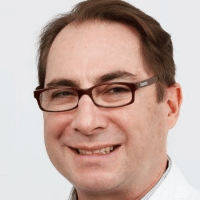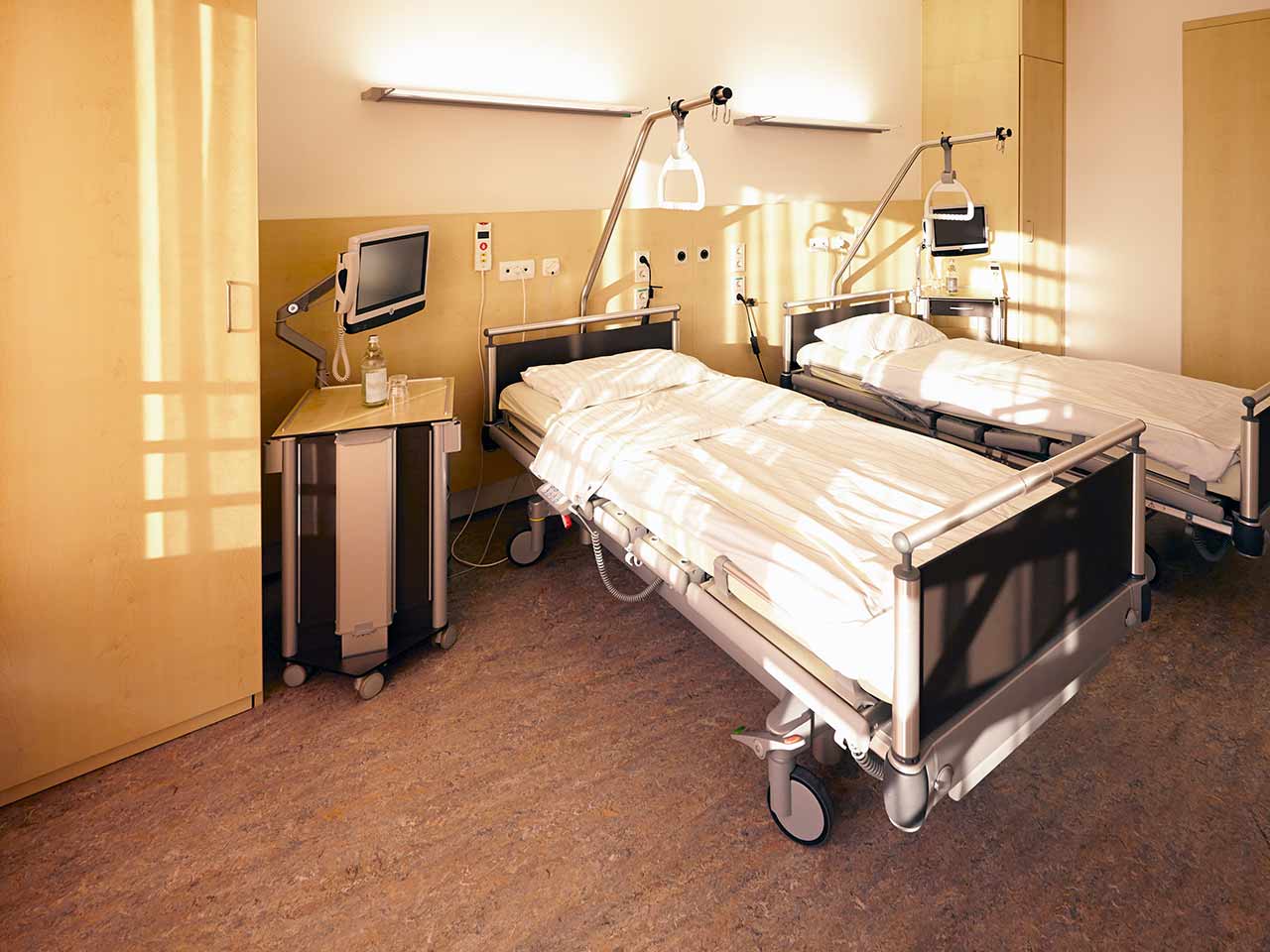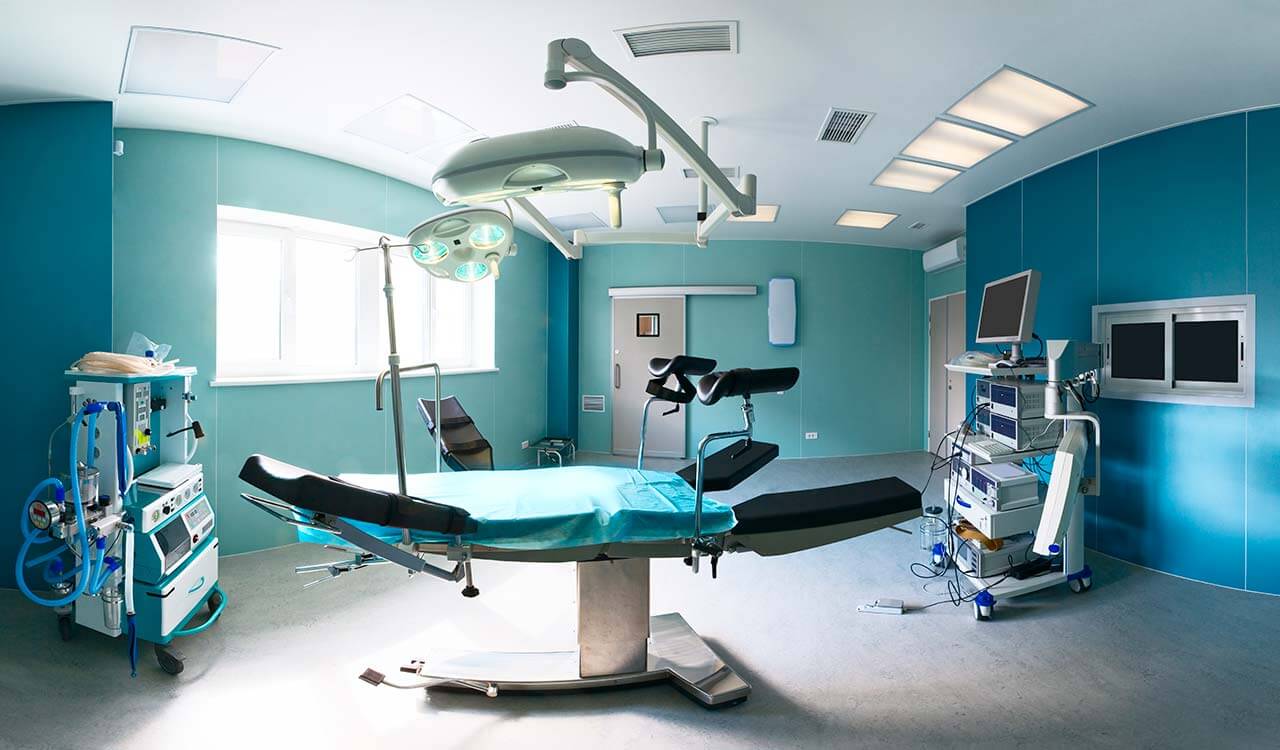
The program includes:
- Initial presentation in the clinic
- clinical history taking
- review of medical records
- physical examination
- neurological examination
- laboratory tests:
- complete blood count
- general urine analysis
- biochemical blood test
- inflammation markers (CRP, ESR)
- blood coagulation analysis (aPTT, PT, INR)
- doppler ultrasonography of head and neck vessels
- CT/MRI scan of the head
(if indicated clinically, additional cost is 650/1200€) - MR-angiography of head and neck vessels
(if indicated clinically, additional cost is 1300€) - nursing services
- services of all leading experts
- explanation of individual treatment plan
Required documents
- Medical records
- Doppler ultrasound/duplex scanning of the brain vessels (if available)
- Angiography (if available)
- Brain MRI/CT scan (if available)
Service
You may also book:
 BookingHealth Price from:
BookingHealth Price from:
About the department
The Department of Spinal Surgery at the Helios Hospital Hildesheim offers modern surgery for the treatment of the full range of spinal diseases and injuries. The department's competence also includes pain therapy for chronic back pain. The patients with spinal injuries receive high-quality emergency care. The Chief Physician of the department is Dr. med. Rafael de la Riva.
The department annually admits more than 1,500 inpatients and about 6,000 outpatients. The department's specialists use in their work sparing minimally invasive surgical techniques that allow achieving an excellent treatment outcome and at the same time significantly reduce the period of postoperative recovery. The operating rooms have advanced equipment and modern neuromonitoring systems that ensure high safety of the surgical treatment. The department's surgeons have unique clinical experience, thanks to which they achieve recovery of patients even in specially complex spinal pathologies and injuries.
One of the priority focuses of the department's clinical activities is on the operations for the treatment of spinal disc herniation. The surgeons of the medical facility usually use microsurgical and endoscopic techniques. Microsurgical removal of a herniated disc is aimed at eliminating compression of the contents of the spinal canal by a hernia. The essence of the operation is to remove the hernial protrusion using a minimally invasive approach, without damaging healthy muscle and bone structures. The use of microsurgical techniques practically eliminates the risk of damage to nerve endings, and also contributes to a rapid recovery after surgery. In addition, such interventions cause minimal postoperative pain syndrome.
The department quite often performs intervertebral disc replacement. The main indications for such operations include degenerative spinal diseases, chronic back pain, spinal disc herniation with compression of the spinal nerve roots, and other pathological changes. The intervertebral disc replacement surgery consists of two stages – removal of the affected intervertebral disc and the implantation of an artificial one. Prior to the operation, the patient undergoes laboratory and instrumental diagnostics, based on the results of which the doctors determine the optimal type of replacement surgery (partial or total) and the most suitable type of prosthesis. The surgical procedure is performed under general anesthesia, through small skin incisions 3-4 cm long. During the operation, the doctor uses special micro-instruments and a surgical microscope. The duration of the procedure is from 30 minutes to one and a half hours. The patient gets to his feet the very next day after the operation, after which rehabilitation begins.
The department also successfully performs spinal stabilization surgery, decompression interventions for spinal stenosis, operations for the treatment of osteoporotic vertebral fractures, operations for spondylolisthesis and many other interventions. The use of the advanced surgical techniques and computer-assisted navigation systems guarantees the patient the highest safety during interventions, while the professional skills of the surgeons working in the medical facility provide the achievement of the best results, relieving the patient of pain syndrome and giving him a chance for a decent quality of life.
The department's range of medical services includes:
- Microsurgical interventions on the intervertebral discs
- Intervertebral disc replacement
- Decompression interventions for spinal stenosis
- Stabilizing spinal interventions
- Vertebral replacement surgeries for fractures or tumors
- Vertebral augmentation using bone cement for osteoporotic fractures
- Surgery for spondylolisthesis
- Peripheral nerve compression syndromes
- Peripheral nerve compression syndromes (carpal tunnel syndrome, cubital tunnel syndrome)
- Surgery to remove spinal fluid cysts
- Pain therapy for chronic back pain (for example, sciatica, phantom pain, pain caused by tumors, head and face pains)
- Emergency care for spinal injuries
- Other therapeutic options
Photo of the doctor: (c) Helios Kliniken GmbH
About hospital
The Helios Hospital Hildesheim positions itself as an advanced provider of high-quality medical services at the European level. The medical facility is an Academic Hospital of the Hannover Medical School, thanks to which it can successfully introduce the very latest medical achievements into clinical practice. The hospital is distinguished by the excellent quality of diagnostics, highly effective treatment of pathologies of any severity and the best patient care based on understanding and humane attitude. The history of the medical complex dates back to 1838, so it carefully honors traditions, but at the same time the hospital actively uses innovative diagnostic and treatment methods. The medical team of the hospital consists of more than 1,450 people. The hospital employs highly qualified doctors who are rightfully proud of their treatment outcomes.
The medical facility has 579 beds. The team of doctors working at the hospital treats more than 28,000 inpatients and about 80,000 outpatients every year. The patients from foreign countries often undergo diagnostics and treatment in the hospital, which confirms the excellent reputation of the medical center in the international arena.
The hospital offers highly specialized departments with different medical focuses, including oncology, cardiology, gastroenterology, gynecology, dermatology, otolaryngology, general and abdominal surgery, plastic and aesthetic surgery, traumatology, etc. Many medical fields are awarded with prestigious certificates, including German Cancer Society (DKG) certification, IQM certification, and others.
Photo: (с) depositphotos
Accommodation in hospital
Patients rooms
The patients of the Helios Hospital Hildesheim live in spacious and light rooms. The furnishings of a standard patient room includes an automatically adjustable bed with an orthopedic mattress, a bedside table, and a wardrobe for storing things. All patient rooms have telephone, radio and TV, as well as free Wi-Fi. For maximum convenience of patients, each room has an ensuite bathroom with shower and toilet.
If desired, the patient can stay in an enhanced-comfort room. Such rooms are distinguished by a more sophisticated design, and are additionally equipped with a safe, a minifridge and upholstered furniture.
Meals and Menus
The patients of the hospital are offered tasty and varied meals. Diet and vegetarian menus are also available. If the patient follows a special diet recommended by the attending physician, he will be provided with food cooked from approved products.
Breakfast is served buffet style: eggs, various types of cheese, sausage, buns, jam, vegetables. There are three set menus to choose from for lunch. Dinner is also served buffet style.
In addition, the hospital has a cozy cafe called Leckeria where one can have a delicious snack. The range of dishes includes light salads, hearty set meals, snacks, sandwiches, cakes, as well as tea, coffee and soft drinks. The terrace is open in the summertime.
Further details
Standard rooms include:
Television
All patient rooms have a TV set. The TV can be used with headphones – the patients can use their own headphones or ask for the headphones from the staff.
Religion
The patient can talk with a Christian priest at any time. Divine services are held every Sunday at 10 am (on the ground floor).
Other religious services are available upon request.
Accompanying person
During the inpatient program, the accompanying person can stay with the patient in a patient room or at a hotel of his choice. Our managers will help you choose the most suitable option.
Hotel
During the outpatient program, the patient can stay at a hotel of his choice. Our managers will help you choose the most suitable option.




